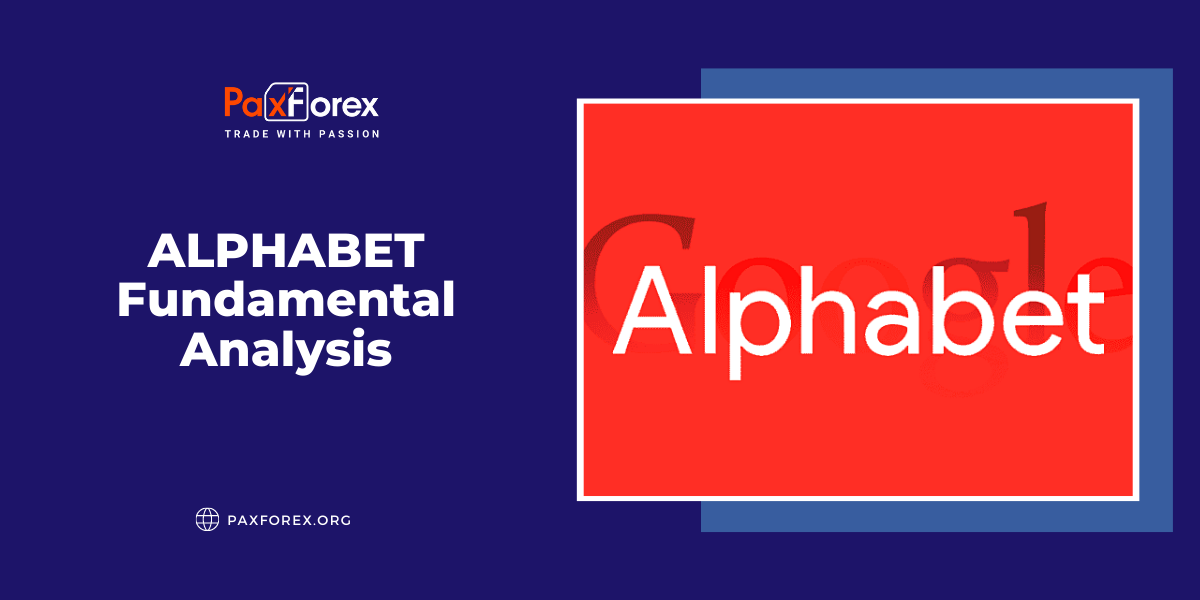
Source: PaxForex Premium Analytics Portal, Fundamental Insight
Alphabet's market cap has briefly surpassed Apple's several times over the past decade, with the last instance occurring on January 29, 2019, when Alphabet was valued at $744 billion, slightly ahead of Apple’s $729 billion. Currently, Alphabet is valued at $1.97 trillion, while Apple stands at $3.3 trillion, retaining its position as the world’s most valuable publicly traded company, with Alphabet ranking fourth. Both companies have delivered remarkable returns, but can Alphabet challenge Apple's lead by 2025?
Though Alphabet’s Google and Apple dominate the mobile operating system space, their business models are quite different. Alphabet generates most of its revenue from Google's advertising ecosystem, including search and display ads, its advertising network, and YouTube. In contrast, Apple relies heavily on iPhone sales, which contribute nearly half of its total revenue. Apple's services segment, which includes the App Store and subscriptions, accounts for over a quarter, while Macs, iPads, and other products make up the remainder.
Between fiscal 2018 and fiscal 2023 (which ended last September), Apple’s revenue grew at a compound annual growth rate (CAGR) of 8%, with earnings per share (EPS) increasing by 16%. Apple saw a significant boost in 2021 with the launch of its 5G iPhones, but revenue dipped in fiscal 2023 due to the end of the 5G upgrade cycle, cooling demand in China, and reduced pandemic-driven sales of Macs and iPads.
During the same period, Alphabet’s revenue grew at a CAGR of 18%, while its EPS grew at 22%. Although Alphabet’s ad sales slowed during the pandemic, its growing cloud business helped mitigate the impact. After a rebound, Alphabet’s ad revenue faced renewed pressure over the last year due to inflation, rising interest rates, and other macroeconomic challenges.
Both companies are investing heavily in artificial intelligence (AI). Apple is integrating "Apple Intelligence" into its services, enabling features like message writing, photo and video search, and image generation from text prompts. Alphabet, on the other hand, continues to expand its Gemini platform to handle more generative AI tasks.
Both companies have also returned substantial capital to shareholders. Over the past five years, Apple has repurchased 14% of its shares, while Alphabet reduced its share count by 11%. Apple consistently raises its dividend, while Alphabet launched its first-ever dividend earlier this year.
Despite Alphabet's faster growth, Apple has outperformed Alphabet over the past five years for several reasons. First, Apple's premium branding, pricing power, and low reliance on advertising insulated it from many of the economic challenges affecting consumer spending. In contrast, Alphabet’s ad-heavy business was more vulnerable.
Second, Alphabet faces greater long-term risks. Google is grappling with growing competition in AI from OpenAI and Microsoft, while OpenAI's ChatGPT threatens its core search business. Moreover, Google Cloud trails behind Amazon Web Services (AWS) and Microsoft Azure in the cloud market.
Lastly, Alphabet faces more immediate regulatory challenges. The US Department of Justice recently ruled that Google monopolized the online search and advertising sectors. This could result in the company being broken up or forced to share data with competitors, which has weighed on its valuation.
In terms of valuation, Alphabet trades at 18 times forward earnings, making it the cheapest stock among the Magnificent Seven. In contrast, Apple trades at a much higher multiple of 28 times forward earnings.
Looking ahead, analysts expect Alphabet's EPS to grow at a 20% CAGR from 2023 to 2026. If Alphabet meets these expectations and maintains its current valuation, its stock could rise by 13% to $180 by 2025, raising its market cap to about $2.2 trillion.
Meanwhile, analysts forecast Apple's EPS to grow at a CAGR of 11% over the same period. If Apple sustains its premium valuation, its stock could increase by 8% to $234, pushing its market cap to $3.6 trillion by 2025. However, if Apple's valuation drops to Alphabet’s level (18 times earnings), its stock could fall by 30% to $150, reducing its market cap to $2.3 trillion.
While it seems unlikely that Alphabet will overtake Apple’s market cap by 2025, Alphabet could generate higher returns if it successfully navigates its challenges. Apple, on the other hand, will need to continue delivering innovative products and services to maintain its premium valuation.
As long as the price is above 155.00, follow the recommendations below:
- Time frame: D1
- Recommendation: long position
- Entry point: 164.18
- Take Profit 1: 170.00
- Take Profit 2: 175.00
Alternative scenario:
If the level of 155.00 is broken-down, follow the recommendations below:
- Time frame: D1
- Recommendation: short position
- Entry point: 155.00
- Take Profit 1: 145.00
- Take Profit 2: 140.00













